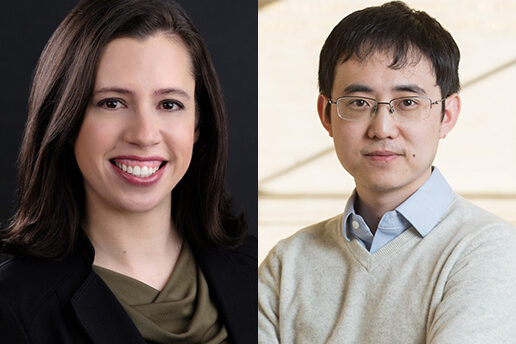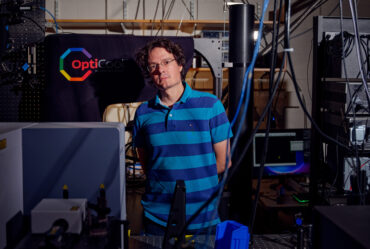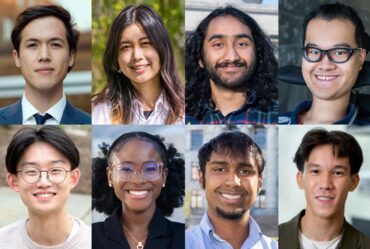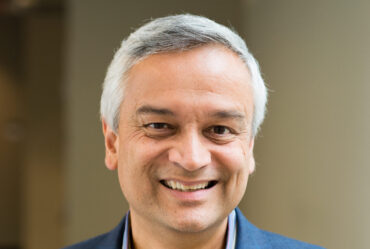
Seven from MIT named 2022 Sloan Research Fellows
Early-career researchers honored for creativity, innovation, and research accomplishments.
Seven members of the MIT faculty are among 118 early-career researchers recently named recipients of the 2022 Sloan Research Fellowships by the Alfred P. Sloan Foundation. Representing the departments of Chemistry, Economics, Electrical Engineering and Computer Science, Mathematics, and Physics, the honorees will each receive a two-year, $75,000 fellowship to advance their research.
Including this year’s recipients, a total of 309 MIT faculty have received Sloan Research Fellowships since the first fellowships were awarded in 1955.
“Today’s Sloan Research Fellows represent the scientific leaders of tomorrow,” says Adam F. Falk, president of the Alfred P. Sloan Foundation. “As formidable young scholars, they are already shaping the research agenda within their respective fields — and their trailblazing won’t end here.”
2022 Sloan Fellow Netta Engelhardt, the Biedenharn Career Development Assistant Professor of Physics, is a researcher in the Center for Theoretical Physics. She researches the dynamics of black holes in quantum gravity, and uses holography to study the interplay between gravity and quantum information. Her primary focus is on the black hole information paradox — that is, black holes seemed to be destroying information that, according to quantum physics, cannot be destroyed. She also studies the thermodynamic behavior of black holes and the validity of so-called cosmic censorship conjecture, which hypothesizes that singularities that result from gravitational collapse are always hidden behind event horizons.
Manya Ghobadi is a TIBCO Career Development Assistant Professor in the Department of Electrical Engineering and Computer Science and an investigator in the Computer Science and Artificial Intelligence Laboratory. A computer systems researcher with a networking focus, she has worked on a broad set of topics; many of the technologies she has helped develop are part of real-world systems. Her research interests include reconfigurable networks, networks for machine learning, data center networks, high-performance cloud infrastructure, network optimization, hardware-software co-design, optical networks.
Phillip Isola, the Bonnie and Marty (1964) Tenenbaum Career Development Assistant Professor in the Department of Electrical Engineering and Computer Science and an investigator in the Computer Science and Artificial Intelligence Laboratory. He explores why we represent the world the way we do, and how we can replicate these abilities in machines through computer vision, machine learning, and artificial intelligence. His group’s current research topics include representation learning, generative modeling, and multiagent systems — as well as the applications and misuses of these systems.
Simon Jäger is the Silverman Family Career Development Assistant Professor of Economics in the School of Humanities, Arts, and Social Sciences. His research focuses on labor markets and studies the origins and consequences of inequality. He works on topics such as competition in the labor market, unions and other forms of worker representation, unemployment, and the role of psychological factors in the labor market. One line of his work has studied the causal effects of giving workers the right to participate in their firm’s decision-making and electing employee board representatives on outcomes such as productivity and wages. Some of his recent work sheds light on how workers’ misperceptions about wages they could earn elsewhere give rise to firms’ market power to set lower wages and sustain a low-wage sector in the labor market. Methodologically, his research combines experimental and quasi-experimental methods with large, administrative data sets, for example from Germany, Finland, or Argentina.
Assistant professor of physics Long Ju’s research focuses on understanding light-matter interactions in novel quantum materials, especially atomically thin materials and van der Waals hetero-structures of them. His lab creates devices and applies electric and magnetic fields to achieve external control of material properties, such as controlling the stacking order and electrically tuning the band structure and charge doping. By including electron correlations and topology, he seeks to design and engineer more exotic electrical and optical properties of these two-dimensional quantum materials. His research team also develops advanced experimental tools for the study of quantum materials. One example is a custom-built near-field infrared (IR) nanoscope and spectroscope that can characterize diverse materials at the nanoscale by exploring their interactions with light.
Assistant professor of mathematics Lisa Sauermann‘s main research interests are extremal and probabilistic combinatorics, and her research also connects to probability theory, number theory, and theoretical computer science. With a collaborator, she proved an inverse theorem for the quadratic Littlewood-Offord problem. A favorite problem of hers is the Erdös-Ginzburg-Ziv problem, which asks, for some given numbers m and n, how large one needs to make a subset of an n-dimensional integer grid to make sure that one can always find m points whose average is again an integer grid point. In 2021, she received the European Prize in Combinatorics for her “profound contribution to combinatorics,” and, in particular, for her results on the growth rate of algebraically defined graph classes, for the solution of a conjecture of Erdös, Faudree, Rousseau, and Schelp, and for the solution of the edge-statistics conjecture.
Daniel Suess, the Class of 1948 Career Development Professor in the Department of Chemistry, uses molecular chemistry to explain global biogeochemical cycles. In the fields of inorganic and biological chemistry, Suess and his lab look into understanding complex and challenging reactions and clustering of particular chemical elements and their catalysts. Most notably, these reactions include those that are essential to solar fuels. Suess’s efforts to investigate both biological and synthetic systems have broad aims of both improving human health and positively impacting the environment.


